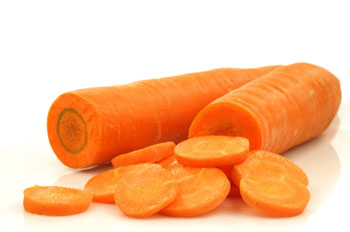
Carrots are rich in vitamin A.
Carrots are often thought of as the ultimate health food. You were probably told to "eat your carrots" by your parents and you probably tell your kids the same thing, and when asked why, you explain, "Because they're good for you!"
But how did the carrot get such a good reputation and why exactly are the root vegetables so good for our health?
It is believed that the carrot was first cultivated in the area now known as Afghanistan thousands of years ago as a small forked purple or yellow root with a woody and bitter flavor, resembling nothing of the carrot we know today.1
Purple, red, yellow and white carrots were cultivated long before the appearance of the now popular orange carrot, which was developed and stabilized by Dutch growers in the 16th and 17th centuries.1
The modern day carrot has been bred to be sweet, crunchy and aromatic.
This Medical News Today information article on carrots provides a nutritional brealdown of the vegetable and an in-depth look at its possible health benefits, how to incorporate carrots into your diet and any potential risks when consuming carrots.
Nutritional Breakdown of Carrots
According to the United States Department of Agriculture, one medium carrot or ½ cup of chopped carrots is considered a serving size. One serving size of carrots provides 25 calories, 6 grams of carbohydrate, 3 grams of sugars and 1 gram of protein.
Possible Health Benefits of Carrots
An overwhelming body of evidence exists suggesting that increased intake of antioxidant-rich fruits and vegetables reduce cancer and cardiovascular disease risks, carrots included.
Cancer: A variety of dietary carotenoids have been shown to have anti-cancer effects due to their antioxidant power in reducing free radicals in the body.
Lung Cancer: One study found that current smokers who did not consume carrots had three times the risk of developing ling cancer compared with those who ate carrots more than once a week.2
Colorectal Cancer: Beta-carotene consumption has been shown to have an inverse association with the development of colon cancer in the Japanese population.3
Leukemia: Carrot juice extract was shown to kill leukemia cells and inhibit their progression in a 2011 study.4
Prostate Cancer: Among younger men, diets rich in beta-carotene may play a protective role against prostate cancer, according to a study conducted by the Harvard School of Public Health's Department of Nutrition.5
Vision: According to Duke ophthalmologist Jill Koury, MD, vitamin A deficiency causes the outer segments of the eye's photoreceptors to deteriorate, damaging normal vision. Correcting vitamin A deficiencies with foods high in beta-carotene will restore vision.6
Studies have shown that it is unlikely that most people will experience any significant positive changes in their vision from eating carrots unless they have an existing vitamin A deficiency, which is common in developing countries.
So where did all the hype surrounding carrots and vision come from? During World War II, the British Royal Air Force started an advertising campaign claiming that the secret to their fighter pilots clear, sharp vision was carrots. Realistically, the fighter pilot's accuracy was due to a new radar system the British wanted to keep secret from the Germans, but the rumor spread and remains popular today.
Other possible benefits: The antioxidants and phytochemicals in carrots may also help with blood sugar regulation, delay the effects of aging, and improve immune function.
Incorporating Carrots into Your Diet
Carrots can be found in supermarket year-round, but are available locally during their biannual seasons in the spring and fall. They are a versatile vegetable and commonly eaten raw, steamed, boiled, roasted and as an ingredient in many soups and stews. They can be bought fresh, frozen, canned or even pickled.
Carrots are best stored in the refrigerator in a sealed plastic bag. If the greens are still attached to the top of the carrot, remove them before storing to prevent the greens from drawing out moisture and nutrients from the roots. Carrots should be peeled and washed before consuming.
Shredded carrots can be used in coleslaw, on salads, in wraps or as an ingredient in baked goods such as cakes and muffins due to their sweet flavor.
Carrot sticks or baby carrots make for a great snack and are often a popular vessel for herbed dips and hummus and on variety vegetable trays.
Carrots are a popular vegetable to juice because of their sweet mild flavor.
Eating carrots raw or steamed provides the most nutritional value.
Precautions
Overconsumption of vitamin A can be toxic to humans, but is unlikely to be achieved through diet alone (most vitamin overconsumption occurs by supplementation).
Overconsumption of carotene may cause a slight orange tinge in skin color but is not harmful to health.7


No comments:
Post a Comment